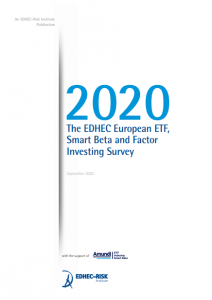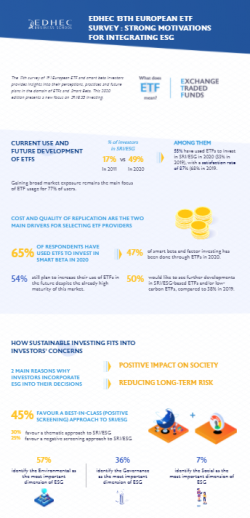

The EDHEC European ETF, Smart Beta and Factor Investing Survey 2020
The latest edition of the EDHEC European ETF, Smart Beta and Factor Investing Survey was conducted as part of the "ETF, Indexing and Smart B ...
Author(s):
Summary:
The latest edition of the EDHEC European ETF, Smart Beta and Factor Investing Survey was conducted as part of the "ETF, Indexing and Smart Beta Investment Strategies" research chair at EDHEC-Risk Institute, in partnership with Amundi.
With this survey, we aim to provide insights into investor perceptions of exchange-traded funds (ETFs) and of smart beta and factor investing strategies, building on the analysis of this year’s responses and relating them to past results of our annual survey.
In 2020, the survey results show a slowdown in the use of smart beta and factor investing strategies, and a growing interest for the integration of an SRI/ESG component into investment.
- The data shows an increase in the use of ETFs to invest in SRI/ESG (55% of respondents in 2020, versus 33% in 2019), with a satisfaction rate of 87% (68% in 2019).
- Achieving broad market exposure still tops the list of reasons for using ETFs, with 77% of respondents using them frequently for this purpose.
- Cost and quality of replication still remain the two main drivers for selecting ETF providers. 50% of respondents would like to see further developments in SRI/ESG-based ETFs and/or low-carbon ETFs, compared to 38% in 2019.
- 65% of respondents incorporate ESG into their investment decisions to allow for a positive impact on society and 58% of them to reduce long-term risk.
- However, the majority (63%) do not want this to be done at the expense of performance.
- More respondents (45%) favour a best-in-class (positive screening) approach to SRI/ESG implementation over the thematic approach (30%) and the negative screening approach (25%).
- The majority of respondents (57%) identify the E (Environmental) as the most important dimension of ESG. The G (Governance) comes second (36%) and the S (Social) ranks last with only 7%.
- The survey further reveals that improving performance and managing risk are the two main motivations for using smart beta and factor investing strategies.
- Despite this strong level of motivation, 70% of respondents invest less than 20% of their total investments in these strategies.
- However, 48% of respondents plan an increase of more than 10% in terms of assets in their use of smart beta and factor investing products in the near future.
- When asked about the smart beta solutions they think require further development by providers, respondents cited ESG, fixed income and alternative asset classes.
- They would also like to see more customised solutions developed. The development of new products corresponding to these demands may lead to even higher take-up of smart beta solutions.
Discover main results by clicking on the image:
Register to download PDF
Register/Log in| Type : | EDHEC Publication |
|---|---|
| Date : | 29/09/2020 |


